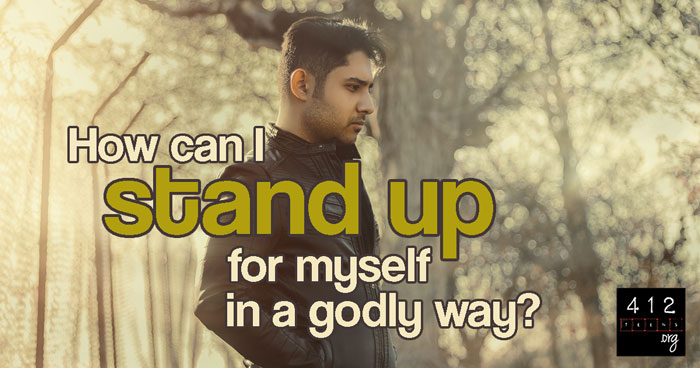How do I stand up for myself in a godly way?

Instances that may require you to stand up for yourself may include bullying, being asked to do something you know is wrong or sinful, setting boundaries with friends or family, and many more. Because every situation is going to be unique, I can't give a "blanket" answer for all situations. Thankfully, there are a couple of biblical principles about this topic that can apply to most situations, and they are based on the call for all believers to respect others.
Respect Authority
I know you're looking for ways to stand up for yourself, but I need to address that God wants us to be obedient to our parents (Ephesians 6:1) and to authority, such as the government, teachers, or employers (1 Peter 2:8). You may find their leadership annoying or even flawed. Because they’re all human, they make mistakes. God still wants us to obey and respect them. This respect may look like withholding gossip about an annoying teacher, doing seemingly pointless jobs for your parent, or holding your tongue rather than belittling someone you want to argue with.
Having respect for our authority figures doesn’t mean we can’t stand up for ourselves though. When asked to do something that goes directly against God, we are to "obey God rather than human beings" (Acts 5:29). If what you're being asked to do will compromise your faith, then, no, you do not need to obey. You DO, however, still need to be respectful about it and be prepared to accept whatever consequences may come from your disobedience. Ask God for wisdom on how to discuss your disagreement and how to move forward peacefully (James 1:5; Romans 12:18).
Respect Your Peers
If you find you need to stand up for yourself with someone your own age, the principles are similar. Pray. Find ways to discuss your concerns without fighting or arguing. Avoid bad or morally-precarious situations if possible. Get a trusted adult involved if necessary.
When it comes to relationships with peers, the big difference is that, though it may not feel like it, you have the power. You have so many options, though not all of them are good. You have the power to gossip about how horrible someone is, possibly ruining friendships or reputations. You have the power to physically fight with siblings or bullies, hurting people or property. You have the power to get yourself and others into trouble by seeking vengeance.
You ALSO have the amazing power to be a light for God. Mathew 5:44-45a says, “But I tell you, love your enemies and pray for those who persecute you, that you may be children of your Father in heaven.” Another way to translate this is "that you may be SEEN as children of your Father in heaven." As followers of Christ, we are His representatives on earth. Let your reaction to difficult situations reflect Jesus. So, whatever you decide to do, treat the other person with kindness and respect (Colossians 3:17).
Respect Yourself
One reason we need to stand up for ourselves is because we are humans with human needs. We all need to dedicate moments to relax and recharge. We all need to do what we can to protect ourselves from the things we know are harmful. This has taken me years to learn, and I’m still not very good at it. I tend to want to help everyone and do what I can to make everyone happy, but that's an easy way to get burned out.
It’s important to take time to learn about yourself, including God in the process (Philippians 4:6; James 1:5). How much responsibility can you healthily handle? What is asking too much? How much time and emotional energy can you invest in your relationships? What are your personal convictions? What are your personal boundaries? For example, I’ve learned over the years that I need my sleep. It’s very difficult for me to function without it. As a rule, I don’t volunteer for things that will require compromising my sleep.
In the same way God gave you different strengths, He also gave needs, such as the need to rest and relax, the need for good mental health and peace, and the need to rely on Him. Maybe you need to develop boundaries about what activities you will do with friends or what topics you're willing to discuss with someone you just met. Maybe you know that having an hour in the morning for yourself and God is important. It's OK to enforce those boundaries so you can take care of yourself.
As you live your life, care for yourself enough to stand up for your own needs and convictions, and continue to be an ambassador for Christ while doing so (Colossians 3:15). This means living your life differently than most of the world lives. Volunteer to help. Hold to a good work ethic. Assist those around you when you see a need. Have a high standard for kindness.
How to Stand Up for Yourself in a Godly Way
The first thing you should do is pray—both for the person you're having issues with and for yourself. Ask God for patience and clarity on both sides (Romans 12:12). Pray that the outcome would be peaceful and that, if it is not, you will have the wisdom to respond as Jesus would (Hebrews 12:14; Romans 12:18).
Next, a good rule of thumb for standing up for yourself is this: discussion not confrontation. If you're having issues with someone, address those concerns with that person if possible and appropriate. It may help to write down your talking points first. If you’re nervous, it’s usually alright to discuss and brainstorm with another trusted adult (such as a parent) how you would like the discussion to go. Just try to do so in a respectful way that doesn’t demean the person you need to talk with.
If the conflict cannot be resolved through discussion, consider removing yourself from the situation if you have the opportunity to do so. This will work in areas like asking to be seated somewhere else in the classroom, picking different teachers next year, finding a different work environment, or just simply walking away (or asking to be picked up).
Finally, please be safe. Again, I don’t know what you are going through personally that prompted you to ask about standing up for yourself in a godly way. But if you are standing up for yourself because you are witnessing something illegal, being asked to do something wrong, or are going through any form of physical/emotional/mental/spiritual abuse, PLEASE do NOT confront that individual. Get help. Do not go to your friends. Express your concerns with another trusted adult or authority figure like the police or a doctor.
You are God's masterpiece (Psalm 139:14), and He loves you deeply (Ephesians 2:4-5). That makes you incredibly valuable. And like anything else valuable, you’re worth taking care of. You are worth being loved and respected too. So please, take care of yourself and do not be afraid to safely protect yourself by standing up.
ALSO SEE:
- What does the Bible say about bravery?
- What does the Bible say about dealing with toxic / abusive people / relationships?
- What does the Bible say about respecting your parents?
- How do I honor or show respect to an abusive parent?
- What are some signs of spiritual abuse?
- How can I stop being a people-pleaser?
- Why does God allow bad things to happen to good people?
- What does it mean that God is sovereign?
- When should you put yourself before others?


TL;DR
Respect others and do so in a way that allows for your own humanity and personal respect. God gave you different strengths, and He also gave needs—such as the need to rest and relax, the need for good mental health and peace, and the need to rely on Him. Developing personal boundaries and convictions is a good way to be prepared to stand up for yourself. When faced with a moment when you need to stand up, remember that kind, respectful discussion is better than angry confrontation. You are God's masterpiece (Psalm 139:14), and He loves you deeply (Ephesians 2:4-5). That makes you incredibly valuable. You’re worth taking care of, being loved, and respected too. Please take care of yourself and do not be afraid to safely protect yourself by standing up.

Writer: Sarah Burkey
Sarah Burkey is a graduate of Frontier School of the Bible with a BA in Youth Ministry. Along the way, she discovered her second passion: geriatric health. Sarah is a physical therapist assistant in a local nursing home. In her free time, she struggles to finish writing her novel, enjoys baking and reading, and watches a little too much anime.
